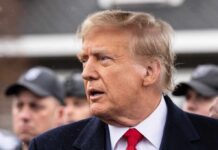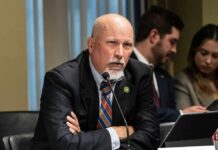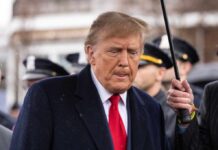
Senate Minority Leader Mitch McConnell (R-KY) said on Monday during an interview with WHAS radio host Terry Meiners that he is “not leaving the Senate” even as he steps down from being party leader and is committed to fighting against the “isolationist movement” within the Republican caucus on Capitol Hill.
The 82-year-old Kentucky Republican’s remarks signal that McConnell plans to clash with GOP senators who are working to put the brakes on U.S. support for foreign nations at war, such as Israel and Ukraine.
Politicians who generally oppose U.S. involvement in foreign wars — like Sen. J. D. Vance (R-OH) and Sen. Rand Paul (R-KY) — take issue with the “isolationist” label.
They say they are like former President Donald Trump and believe the federal government should put America’s security and interests first.
Q: “What’s your mindset now when your feet hit the floor in the morning?”
McConnell: "I'm not leaving the Senate. And I'm particularly involved in fighting back against the isolationist movement in my own party. The symbol lately is ‘are we gonna help Ukraine or not.’” pic.twitter.com/VHZprlxMGY
— Greg Price (@greg_price11) April 1, 2024
On Monday, Meiners asked the Senate Minority Leader, “What’s your mindset now when your feet hit the floor in the morning when you wake up?”
McConnell answered, “Well first let me just say that I’ve served longer as leader than anybody in American history — 18 years. So look, I finally thought it was time to go in a different direction.”
He added that he plans to pursue foreign policy and support a more prominent world policing posture for the United States.
BREAKING: Republican Senate Leader Mitch McConnell declares, "I will fight isolationist Republicans for rest of Senate term," says, he's putting the 'main part of my focus' on opposing Russia in Ukraine. pic.twitter.com/o2cvWOU5s3
— Simon Ateba (@simonateba) April 2, 2024
“But I’m not leaving the Senate. And I’m particularly involved in actually fighting back against the isolationist movement in my own party and some in the other as well,” he said.
McConnell brought the question around to the Russian Federation’s ongoing military invasion of Ukraine. “The symbol of that lately is ‘Are we gonna help Ukraine or not?’ And I think it’s extremely important that we do that.”
“I’m not a particular fan of the Biden administration’s decision to run out of Afghanistan, which was like sending Putin a green light. But we are where we are and the Europeans have stepped up,” he added.
While many Democrat leaders — from former State Secretary Hillary Clinton in 2016 to President Joe Biden in 2020 — have advocated a tough-on-Putin stance, many limited-government conservatives have feared it would be bad for the U.S. economy and ultimately national security to become involved in a protracted conflict with Russia.



























